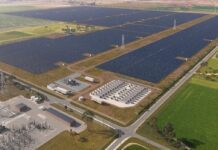
A new white paper released by Monash Business School reveals that large-scale electricity storage is crucial to achieving Australia’s clean energy targets.
Authored by Associate Professor Guillaume Roger from Monash University’s Faculty of Business and Economics, the report, The Storage Imperative: Powering Australia’s Clean Energy Transition, details the challenges and solutions related to integrating storage to support renewable energy.
According to the report, Australia’s goals—43 per cent emissions reduction and 82 per cent renewable energy generation by 2030, as well as net zero by 2050—depend on establishing effective, large-scale electricity storage systems.
These storage solutions are vital to managing the intermittency of renewable energy sources like wind and solar, which often produce excess energy during off-peak times and insufficient power during high-demand periods.
“The problem is that renewable energy must be stored to really be useful; there is too much of it when we don’t need it, and not enough when we do,” said Associate Professor Roger.
“Our current methods of trading electricity and the financial instruments that support it are inadequate for dealing with the unique demands of renewable energy storage.”
Published in conjunction with the Monash Energy Institute, the white paper emphasises that without substantial storage capacity, Australia’s clean energy aspirations could remain out of reach.
The report also outlines several policy reforms to help accelerate storage solutions across the nation. Recommendations include:
- No-Regret Policies: Implementing Locational Marginal Pricing (LMP), a day-ahead market (DAM), and promoting forward contracting to optimise grid efficiency and improve price signals.
- Investment Incentives: Re-evaluating programs like the Capacity Investment Scheme (CIS) to better align with storage needs and minimise taxpayer impacts.
- Reliability Financing: Developing new methods to ensure grid reliability in a storage-based market, potentially through long-term contracts or innovative procurement systems.
- Increased Research Investment: Supporting studies on revenue generation through market design and storage in renewable-centric systems.
Associate Professor Roger highlights the efficiency of these reforms, stating, “They do not cost much to taxpayers, unlike some current government subsidies, and they can be implemented swiftly. Australians should advocate for these changes.”
Monash Energy Institute Director Shreejan Pandey acknowledged the report as a milestone in addressing critical clean energy challenges.
“This white paper underscores the urgency and opportunities in scaling up storage solutions to ensure a resilient and renewable-powered grid,” Pandey said.
“At the Monash Energy Institute, our mission is to inform policies with independent, evidence-based insights that benefit all Australians.”




















